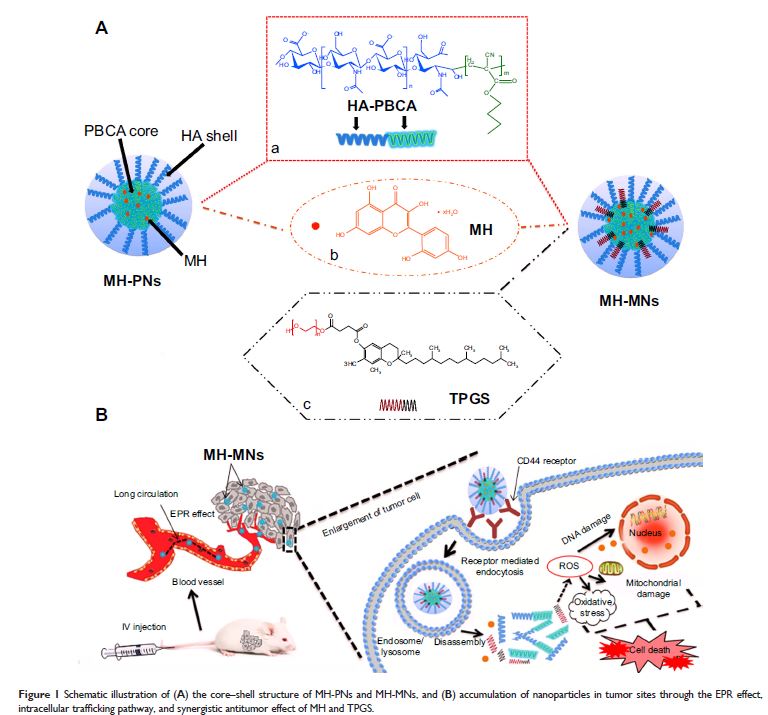109814
论文已发表
注册即可获取德孚的最新动态
IF 收录期刊
- 3.4 Breast Cancer (Dove Med Press)
- 3.2 Clin Epidemiol
- 2.6 Cancer Manag Res
- 2.9 Infect Drug Resist
- 3.7 Clin Interv Aging
- 5.1 Drug Des Dev Ther
- 3.1 Int J Chronic Obstr
- 6.6 Int J Nanomed
- 2.6 Int J Women's Health
- 2.9 Neuropsych Dis Treat
- 2.8 OncoTargets Ther
- 2.0 Patient Prefer Adher
- 2.2 Ther Clin Risk Manag
- 2.5 J Pain Res
- 3.0 Diabet Metab Synd Ob
- 3.2 Psychol Res Behav Ma
- 3.4 Nat Sci Sleep
- 1.8 Pharmgenomics Pers Med
- 2.0 Risk Manag Healthc Policy
- 4.1 J Inflamm Res
- 2.0 Int J Gen Med
- 3.4 J Hepatocell Carcinoma
- 3.0 J Asthma Allergy
- 2.2 Clin Cosmet Investig Dermatol
- 2.4 J Multidiscip Healthc

已发表论文
基于透明质酸聚(氰基丙烯酸正丁酯)和 D-α-生育酚聚乙二醇 1000 琥珀酸酯为桑色素水合物的肿瘤靶向递送的高分子纳米粒子的制备、在体外及体内的评估
Authors Abbad S, Wang C, Waddad AY, Lv HX, Zhou JP
Published Date January 2015 Volume 2015:10 Pages 305—320
DOI http://dx.doi.org/10.2147/IJN.S73971
Received 8 September 2014, Accepted 25 October 2014, Published 6 January 2015
Abstract: Herein, we describe the preparation of a targeted cellular delivery system
for morin hydrate (MH), based on a low-molecular-weight hyaluronic
acid-poly(butyl cyanoacrylate) (HA-PBCA) block copolymer. In order to enhance
the therapeutic effect of MH, D-alpha-tocopheryl polyethylene glycol 1000
succinate (TPGS) was mixed with HA-PBCA during the preparation process. The
MH-loaded HA-PBCA “plain” nanoparticle (MH-PNs) and HA-PBCA/TPGS “mixed”
nanoparticles (MH-MNs) were concomitantly characterized in terms of loading
efficiency, particle size, zeta potential, critical aggregation concentration,
and morphology. The obtained MH-PNs and MH-MNs exhibited a spherical morphology
with a negative zeta potential and a particle size less than 200 nm, favorable
for drug targeting. Remarkably, the addition of TPGS resulted in about 1.6-fold
increase in drug-loading. The in vitro cell viability experiment revealed that
MH-MNs enhanced the cytotoxicity of MH in A549 cells compared with MH solution
and MH-PNs. Furthermore, blank MNs containing TPGS exhibited selective
cytotoxic effects against cancer cells without diminishing the viability of
normal cells. In addition, the cellular uptake study indicated that MNs
resulted in 2.28-fold higher cellular uptake than that of PNs, in A549 cells.
The CD44 receptor competitive inhibition and the internalization pathway
studies suggested that the internalization mechanism of the nanoparticles was
mediated mainly by the CD44 receptors through a clathrin-dependent endocytic
pathway. More importantly, MH-MNs exhibited a higher in vivo antitumor potency
and induced more tumor cell apoptosis than did MH-PNs, following intravenous
administration to S180 tumor-bearing mice. Overall, the results imply that the
developed nanoparticles are promising vehicles for the targeted delivery of
lipophilic anticancer drugs.
Keywords: anti-tumor effect, hyaluronic acid, TPGS, morin hydrate, nanoparticles
Keywords: anti-tumor effect, hyaluronic acid, TPGS, morin hydrate, nanoparticles
